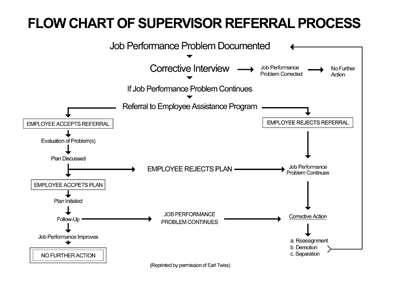- About Ramapo
- Academics
- Admissions & Aid
- Student Life
- Athletics
- Alumni
- Arts & Community
- Quick Links
- Apply
- Visit
- Give
Supervisor’s Tool Box For Dealing With Chemically Dependent Employees
Avoid Being the Troubled Supervisor
Troubled employees beget troubled supervisors.
It is clear that each chemically dependent employee begets at least one troubled supervisor.
These employees have an uncanny knack for manipulating the feelings of supervisors. A favorite ploy is the “whipped child” syndrome characterized by the “hang dog” look and the “I can’t do anything right” verbalizations. Almost invariably these behaviors will tug at parental heartstrings and suddenly supervisors find themselves comforting and supporting the employee rather than confronting them. At other times, outbursts of righteous indignation by employees frighten supervisors and cause them to back off.
Chemically dependent and troubled employees have a great deal of experience at playing these games. Without an understanding of what’s going on, supervisors don’t stand a chance.
The most important feelings which the supervisor will have (which closely parallel those of the substance abuser) are:
Anger – Triggered by broken promises, poor work performance and absenteeism.
There is also self-directed anger at his inability to change his/her employee.
Guilt – Supervisors feel guilty. The guilt is mirrored in thoughts like, “What have I done wrong?” “Why can’t I handle the situation?” “It was wrong to lose my temper.” “Why didn’t I say something!”
The guilt leads to feelings of inadequacy. “I’m a poor supervisor, etc.” When we feel inadequate to handle a situation, we will tend to avoid dealing with it.
Fear – Supervisors are often fearful of getting into discussions about employee problems which they tend to view as highly personal. Some may fear criticism in return for some real or imagined failing. Perhaps, in some cases, the supervisor fears criticism of his/her own drinking behavior.
Ego Involvement (Co-Dependency) – Another strong psychological factor in some cases is ego involvement between supervisors and employees. This is usually the case where they have been together for a long time. The supervisor often feels that he has molded his employee in his own image. His employee’s success and failure become his success and failure.
Feel comfortable in your role as a supervisor who keys in on job performance. The troubled employee is one whose work record, once satisfactory, has begun to show signs of serious deterioration. This deterioration may show itself in increased absences, increasing use of sick leave, lateness, decreasing or inadequate productivity or growing difficulties with fellow employees.
How to Confront a Troubled Employee
Establish – levels of work performance you expect.
Record – all absenteeism, poor job performance, etc.
Be Consistent – don’t tolerate more with one employee than you would with another.
Don’t be an Armchair Diagnostician.
Base the confrontation on Job Performance.
Be Firm – but tell him/her you are there to help. Try to gain a trustful relationship.
Be Honest – don’t hedge, speak with authority.
Be Ready – to cope with the employee’s resistance, defensiveness and even hostility.
Accept No Excuses for failure.
Try to Get Him/Her To Acknowledge the problem.
Set Up A Plan For Improvement.
Don’t make Value Judgements.
Don’t Moralize.
Never ask Why do you do this or that, or why do you drink so much, etc.
If the employee says he/she is “Sick” or makes other excuses, let him/her know that there is no excuse for prolonged impaired performance.
Don’t let him/her play you against higher management and/or the Union, No Union Ever Praised Poor Job Performance.
Get a Commitment from him/her and monitor it.
Don’t Make Idle Disciplinary Threats.
When Confronting a problem drinker be specific about the behavior/poor job performance.
Remember – take the responsibility to intervene. Don’t be afraid to interfere or get involved. You have a legitimate right to interfere when his/her behavior is interfering with job performance. Remember, it is highly probable that a troubled employee’s performance will improve if her-she is confronted constructively and consistently. It is a fact that he/she may get worse if he/she is ignored or just warned occasionally.
Impairment Checklist
Fitness for Duty Observation Checklist
Employee’s Appearance
______ sloppy
______ inappropriate clothing
Mood
______ withdrawn
______ sad
______ mood swings, high and low
______ suspiciousness
______ extreme sensitivity
______ nervousness
______ frequent irritability with others
______ preoccupation with illness and death (morbidity)
Actions
______ physically assaultive (or threatening)
______ unduly talkative
______ exaggerated self-importance
______ rigidity – inability to change plans with reasonable ease
______ making incoherent or irrelevant statements on the job
______ over compliance with any routine (making it a ritual)
______ frequent argumentativeness
______ frequent outbursts of crying
______ excessive amount of personal telephone time Absenteeism
______ multiple instances of improper reporting of time off
______ excessive sick leave
______ repeated absences following a pattern
______ excessive lateness in the morning, or upon returning from lunch
______ peculiar and increasingly improbable excuses for absences
______ high absenteeism rate for colds, flu, gastritis, general malaise, etc.
______ frequent unscheduled short-term absences (with or without medical explanation)
______ frequent use of unscheduled vacation time “On The Job” Absenteeism
______ continued absence from job location more than the job requires
______ frequent trips to water fountain or restroom
______ long coffee breaks
Accidents
______ physical complaints on the job
______ accidents on the job
______ accidents off the job
Work Patterns and Production
______ current work assignment requires more effort than previously taken
______ work takes more time to produce
______ difficulty in recalling instructions, understanding office procedures, etc.
______ display of disinterest in work
______ increased difficulty in handling complex assignments
______ difficulty in recalling previous mistakes (although these have been brought to the employee’s attention)
______ general absentmindedness, forgetfulness
______ alternate periods of high and low productivity
______ coming to work in an intoxicated condition
______ missed deadlines
______ mistakes due to poor judgment
______ outside complaints bout the employee’s work
______ improbable excuses for these poor patterns
______ carelessness employee relationships on the job
______ over-reaction to real or imagined criticism
______ wide swings in job morale
______ borrowing money from co-workers
______ unreasonable resentments against co-workers
______ repeated and compulsive criticism of the company
______ persistent requests for job transfer
______ unrealistic expectation for promotion
______ abrasiveness with others (managers and/or co-workers)
Work Related Relationship in the Community
______ inappropriate behavior at company business meeting
______ complaints from the community concerning the employee

Copyright ©2025 Ramapo College Of New Jersey. Statements And Policies. Contact Webmaster.


Follow Ramapo